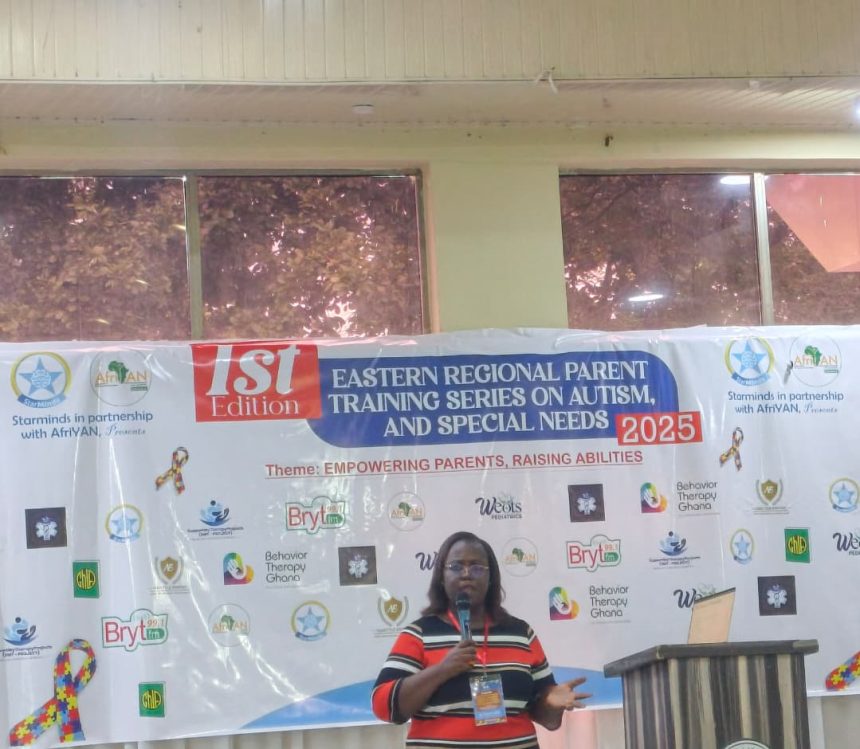A father whose triplets were each diagnosed with autism in 2020 is pleading for urgent and affordable early intervention, as Starminds therapy centre opens the Eastern Regional first autism parent training series in Koforidua.
The programme brought together over 60 caregivers, health professionals, and educators to strengthen child development and promote inclusion for children with autism and related conditions.
Held at the Koforidua Library on the theme “Empowering Parents, Raising Abilities,” the event was organised by Starminds, a Ghanaian therapy and intervention centre, in partnership with AfriVAN.
Speaking with the Ghana News Agency, Mr. Kwabena Barnafo, a parent who attended the training with his wife, shared the emotional and practical challenges of raising triplets diagnosed with autism spectrum disorder.
“We brought forth triplets—two boys and one girl. You are thrown into a world you have no experience in, and because we are learned people, we began to realise they were not meeting milestones,” he said.
He explained that the lack of early guidance compounded their difficulties. “Even at two and a half years, we were still thinking they would grow out of it. Nobody told us we needed early intervention. By the time we sought therapy, we were already overwhelmed.”
Mr. Barnafo noted that therapy brought significant progress. “At three years, they were very hypersensitive and could not sit down or focus,” he said.
“After therapy, they can now sit, follow instructions, and even look at your face when you talk to them. We have learnt that communication is not just talking, but also reacting,” he added.
Mrs. Sandra Quayson, Speech and language therapist, who is also Founder and CEO of Starminds, described the event as a milestone in her organisation’s efforts to support families living with autism spectrum disorder (ASD) and related developmental conditions.
“This is the beginning of a movement of empowering caregivers, raising abilities, and strengthening systems around children with special needs,” she said.
She urged parents to take active roles in their children’s development, describing them as “the best therapists” and “the first to meet their children in life.”
Mrs. Zahra Ibrahim, Speech therapist, in a presentation said child development relied heavily on daily interaction and meaningful communication.
“It is like a plant. If you are not watching it, it does not respond. If you hide it away, it does not produce. That is the same with children,” she said.
She explained that reading aloud to children stimulated brain growth and language acquisition, adding that “reading builds the brain, strengthens memory, and supports communication.”
She cautioned against confusing noise exposure with language development, noting that “taking a child to the market is not communication. There is a difference between speech and noise.”
Occupational therapist Ms. Stacey Antwi outlined child development as a process of acquiring physical, social, and cognitive skills.
“Development means children learning to sit, stand, walk, run, understand speech, and reason,” said.
Adding, “Each of these is a milestone, and together they form the foundation for independence.”
She said milestone ranges were critical indicators, explaining that “by five or six months, we expect a child to sit. If by eight months a child cannot sit, it signals a concern.”
Ms. Antwi added that environment and experience shaped development and warned that prolonged screen use could slow growth.
“If children are fixed on screens, they are disengaged. They lose opportunities to build skills needed for independence,” she said.
Dr. Gyanwa Opare-Addo, a specialist psychiatrist at the Eastern Regional Hospital, addressed the medical and neurological aspects of developmental challenges.
“These conditions are painful and difficult, both for the children and their families,” she said.
She identified autism, attention deficit hyperactivity disorder (ADHD), and intellectual disabilities as among the most common disorders seen in Ghana.
“Developmental disorders occur when the brain does not mature as expected. At each stage of life there are milestones, and when there is a delay, children present with autism, ADHD, or intellectual disability,” she said.
She urged parents to recognise that communication challenges were not limited to speech, noting that “most of the difficulties children face are in social communication.”
Dr. Opare-Addo said children with ADHD often displayed restlessness and difficulty focusing, adding that “they are not stubborn; they have a developmental condition that requires structured support.”
She stressed the need for early recognition and intervention, saying that “when parents and teachers recognise signs early, they can seek help. With intervention, children can improve and participate more fully in family and community life.”
Starminds provides therapy in speech and language, occupational therapy, and autism-specific interventions, and trains parents, teachers, and caregivers.
The Eastern Regional training series comes amid calls for expanded autism services in Ghana.
Experts say early diagnosis and intervention significantly improve outcomes for children, but stigma, limited awareness, and a shortage of trained professionals remain barriers.
The event continued with interactive sessions where parents and caregivers learned strategies to apply in homes, schools, and communities.
GNA






